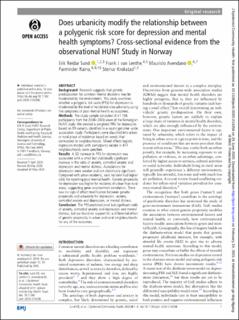| dc.contributor.author | Sund, Erik Reidar | |
| dc.contributor.author | van Lenthe, Frank | |
| dc.contributor.author | Avendano, Mauricio | |
| dc.contributor.author | Raina, Parminder | |
| dc.contributor.author | Krokstad, Steinar | |
| dc.date.accessioned | 2021-03-01T13:37:48Z | |
| dc.date.available | 2021-03-01T13:37:48Z | |
| dc.date.created | 2021-01-06T12:30:02Z | |
| dc.date.issued | 2020 | |
| dc.identifier.citation | Journal of Epidemiology and Community Health. 2020, 1-6. | en_US |
| dc.identifier.issn | 0143-005X | |
| dc.identifier.uri | https://hdl.handle.net/11250/2730965 | |
| dc.description.abstract | Background Research suggests that genetic predisposition for common mental disorders may be moderated by the environment. This study examines whether a polygenic risk score (PRS) for depression is moderated by the level of residential area urbanicity using five symptoms of poor mental health as outcomes. Methods The study sample consisted of 41 198 participants from the 2006–2008 wave of the Norwegian HUNT study. We created a weighted PRS for depression based on 99 variants identified in a recent genome -wide association study. Participants were classified into urban or rural place of residence based on wards that correspond to neighbourhoods. Mixed effects logistic regression models with participants nested in 477 neighbourhoods were specified. Results A SD increase in PRS for depression was associated with a small but statistically significant increase in the odds of anxiety, comorbid anxiety and depression and mental distress. Associations for depression were weaker and not statistically significant. Compared with urban residents, rural resident had higher odds for reporting poor mental health. Genetic propensity for depression was higher for residents of urban than rural areas, suggesting gene–environment correlation. There was no sign of effect modification between genetic propensity and urbanicity for depression, anxiety, comorbid anxiety and depression, or mental distress. Conclusion The PRS predicted small but significant odds of anxiety, comorbid anxiety and depression and mental distress, but we found no support for a differential effect of genetic propensity in urban and rural neighbourhoods for any of the outcomes. | en_US |
| dc.language.iso | eng | en_US |
| dc.publisher | BMJ Publishing Group | en_US |
| dc.rights | Navngivelse 4.0 Internasjonal | * |
| dc.rights.uri | http://creativecommons.org/licenses/by/4.0/deed.no | * |
| dc.title | Does urbanicity modify the relationship between a polygenic risk score for depression and mental health symptoms? Cross-sectional evidence from the observational HUNT Study in Norway | en_US |
| dc.type | Peer reviewed | en_US |
| dc.type | Journal article | en_US |
| dc.description.version | publishedVersion | en_US |
| dc.source.pagenumber | 1-6 | en_US |
| dc.source.journal | Journal of Epidemiology and Community Health | en_US |
| dc.identifier.doi | 10.1136/jech-2020-214256 | |
| dc.identifier.cristin | 1866256 | |
| dc.description.localcode | This is an open access article distributed in accordance with the Creative Commons Attribution 4.0 Unported (CC BY 4.0) license, which permits others to copy, redistribute, remix, transform and build upon this work for any purpose, provided the original work is properly cited, a link to the licence is given, and indication of whether changes were made. See: https://creativecommons.org/licenses/ by/4.0/. | en_US |
| cristin.ispublished | true | |
| cristin.fulltext | original | |
| cristin.qualitycode | 2 | |

